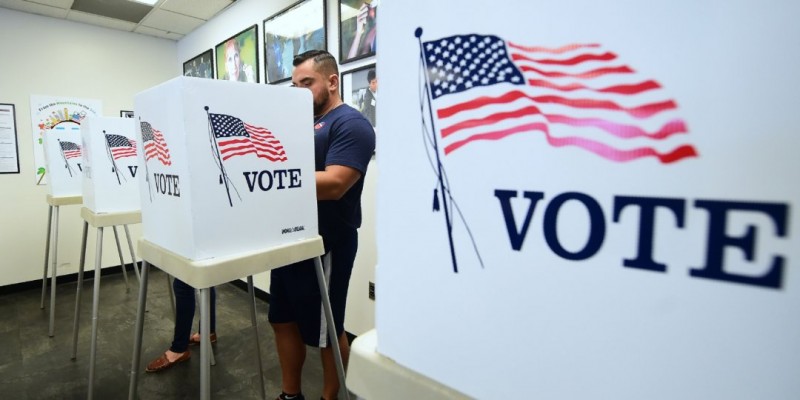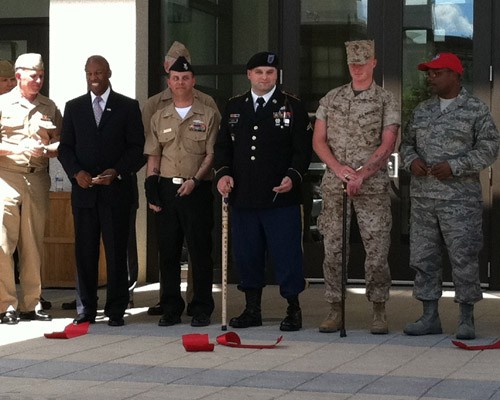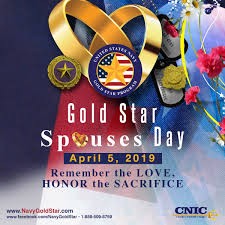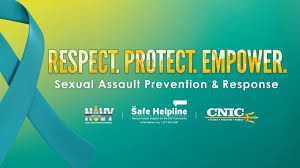The Sexual Assault Prevention and Response (SAPR) Program’s primary goals are to prevent sexual assault from happening in our community and to support victims when an assault is reported. The SAPR program services are confidential and available 24/7. Here are some frequently asked questions regarding sexual assault and the SAPR program.
WHAT IS SEXUAL ASSAULT?
Sexual assault is defined as intentional sexual contact characterized by force, threats, intimidation, or abuse of authority or when the victim does not or cannot consent. It includes rape, forced sodomy (oral or anal sex), touching off a sexualized nature, and attempts to commit these crimes.
WHAT SHOULD I DO IF I’M THE VICTIM OF A SEXUAL ASSAULT?
If you or someone you know is the victim of a sexual assault, it’s important for you to know the reporting options and where to turn for help. By contacting the SAPR 24/7 Victim Advocate duty, you can speak confidentially with a victim advocate and learn about reporting options and available resources.
WHAT IF I’m NOT SURE WHAT HAPPENED IS SEXUAL ASSAULT?
You are more than welcome to contact SAPR Victim Advocates or the Sexual Assault Response Coordinator (SARC) for assistance.
WHO IS CAN ACCESS SAPR SERVICES?
Military dependents 18 years old and older.
WHAT IS THE DIFFERENCE BETWEEN A RESTRICTED AND UNRESTRICTED REPORT?
Restricted – Allows victims to confidentially disclose the assault to specified individuals. The victim can receive medical treatment, including emergency care, victim advocacy & support, counseling, and Victim Legal Counsel (VLC) legal consultation. Restricted reports are a good option for victims who want to access services, but don’t want to participate in a criminal investigation or have their command notified of their report.
Unrestricted – Victims choosing an unrestricted report to have access to the full SAPR services; including victim advocacy & support, medical care, counseling, and Victim Legal Services (VLC). With an unrestricted report, the victim’s Commanding Officer and law enforcement will be notified of the report, potentially leading to a criminal investigation. Because the victim’s Commanding Officer is aware of the report, the victim has access to additional services such as an expedited transfer and military protective orders. An unrestricted report is a good option for victims seeking an expedited transfer or who is in need of other supportive measures from their command. It’s also a good option for victims seeking a criminal investigation.
WHO ARE THE SPECIFIED INDIVIDUALS I CAN CONTACT FOR A RESTRICTED REPORT?
SAPR Victim Advocates, SARCs, and medical providers (including counselors) are the only people who can take restricted reports.
ARE THERE OTHER PEOPLE I CAN TELL AND STILL MAKE A RESTRICTED REPORT?
There are three additional people you can tell about your sexual assault and still be eligible for a restricted report. They are chaplains, VLCs and a friend.
- Chaplains are a great resource for victims of sexual assault who are seeking spiritual support. They have an absolute privilege which prevents them from disclosing information about the assault to the SAPR program. Therefore, they are unable to take a restricted report but are a confidential resource for victims.
- Like chaplains, VLCs are available to victims of sexual assault and do not inform the SAPR program of victim reports. Victims can learn about the legal process and discuss their options with an attorney and maintain confidentiality.
- Victims can now tell a friend, who is not in their direct chain of command, about the assault and still have the option for a restricted report, as long as that friend keeps the information confidential.
IF I MAKE A RESTRICTED REPORT, CAN I CHANGE IT TO AN UNRESTRICTED?
Yes, you can. Restricted reporting documents and evidence (when applicable) are secured for 50 years. Victims can change their mind at any time and reach out to the SARC to change their restricted report to an unrestricted report.
CAN I CHANGE AN UNRESTRICTED REPORT TO RESTRICTED?
Unfortunately, once a case is unrestricted, it cannot be changed to a restricted report because the required notifications have already taken place. However, victims of sexual assault can change their minds about participating in criminal investigations.
WHO ARE/WHAT ARE VICTIM ADVOCATES (VA)?
Victim Advocates are carefully selected, trained, and credentialed military and DoD civilian personnel who provide support and assistance to victims of sexual assault. They are directly supervised by the SARC and are required to maintain the confidentiality of victim communication. In our region, there is a watch bill staffed by SAPR VAs, providing 24/7 access to the SAPR program. You can reach out to a SAPR VA within your command or call the 24/7 duty cell phone.
If you are interested in learning more about the SAPR program or need assistance, please feel free to contact us.
SAPR Duty Cell Phone: 301-442-8225
Civilian Victim Advocate: 202-258-3696
SARC: 301-442-2053
DOD SAFE Helpline: 877-995-5247






